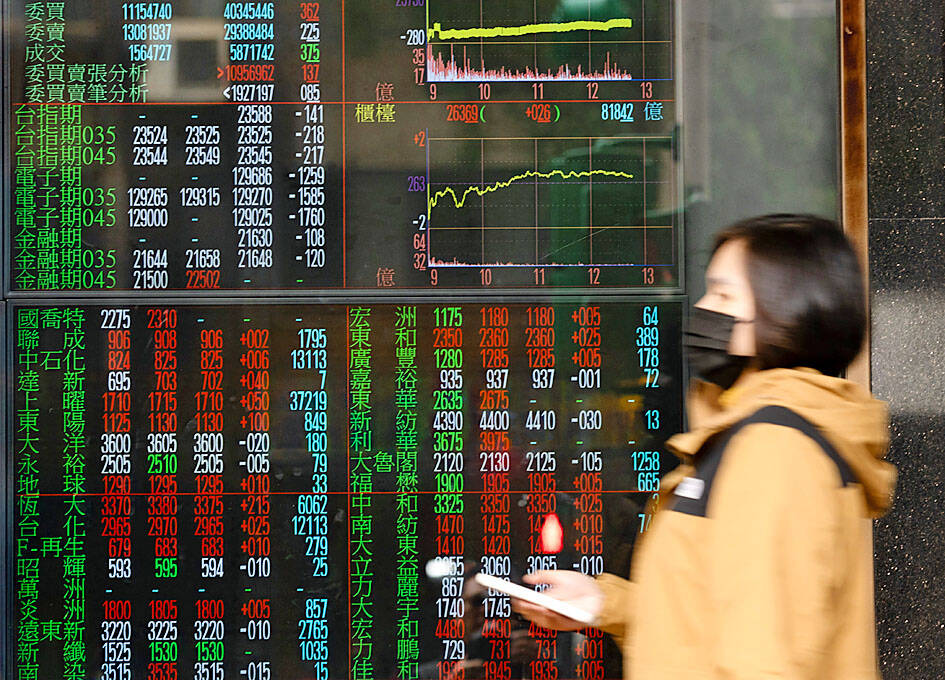Nomura Holdings Inc downgraded Taiwanese equities, citing greater scrutiny of the artificial intelligence (AI) sector and US President Donald Trump’s plans to impose tariffs on trading partners.
Taiwanese stocks were cut to “neutral” from a tactical “overweight” in Nomura’s Asian allocation given “concerns about tariffs, chip sector restrictions, greater AI thematic scrutiny, and elevated valuations and investor positioning,” strategists, including Chetan Seth, wrote in a note on Wednesday.
Taiwan’s equity benchmark has largely remained unchanged this year, with its biggest component — Taiwan Semiconductor Manufacturing Co (TSMC, 台積電) — falling more than 3 percent.

Photo: CNA
That compares with a gain of 3.6 percent in the broader MSCI Asia Pacific Index over the same period.
The TAIEX fell 1.49 percent to 23,053.18 points yesterday, with TSMC dropping 1.89 percent, Taiwan Stock Exchange data showed.
Chinese start-up DeepSeek’s (深度求索) cost-effective AI model — which could rival leading US developers — is raising doubts if companies need to incur significant amounts of capital expenditure to develop such technology. That might weigh on TSMC — the main chip supplier to Apple Inc and Nvidia Corp.
In addition, Trump’s threat of tariffs on semiconductors has complicated Taiwan’s bid to remain a global powerhouse in semiconductor manufacturing and adds pressures on TSMC to move more of its production away from Taiwan.
The company is considering taking a controlling stake in Intel Corp’s factories at the request of Trump administration officials, Bloomberg News reported earlier this month.
Nomura strategists increased their year-end target for the MSCI China Index to 80 from 70, citing renewed investor interest in China’s technological innovation, such as DeepSeek, which “suggests that Chinese equities no longer warrant a deep discount.”
Since returning to the White House on Jan. 20, Trump has imposed a new 10 percent tariff on Chinese goods.
The downgrade comes at a time when China once again unveiled stronger language toward Taiwan, placing further pressure on stocks.

NOT JUSTIFIED: The bank’s governor said there would only be a rate cut if inflation falls below 1.5% and economic conditions deteriorate, which have not been detected The central bank yesterday kept its key interest rates unchanged for a fifth consecutive quarter, aligning with market expectations, while slightly lowering its inflation outlook amid signs of cooling price pressures. The move came after the US Federal Reserve held rates steady overnight, despite pressure from US President Donald Trump to cut borrowing costs. Central bank board members unanimously voted to maintain the discount rate at 2 percent, the secured loan rate at 2.375 percent and the overnight lending rate at 4.25 percent. “We consider the policy decision appropriate, although it suggests tightening leaning after factoring in slackening inflation and stable GDP growth,”

DIVIDED VIEWS: Although the Fed agreed on holding rates steady, some officials see no rate cuts for this year, while 10 policymakers foresee two or more cuts There are a lot of unknowns about the outlook for the economy and interest rates, but US Federal Reserve Chair Jerome Powell signaled at least one thing seems certain: Higher prices are coming. Fed policymakers voted unanimously to hold interest rates steady at a range of 4.25 percent to 4.50 percent for a fourth straight meeting on Wednesday, as they await clarity on whether tariffs would leave a one-time or more lasting mark on inflation. Powell said it is still unclear how much of the bill would fall on the shoulders of consumers, but he expects to learn more about tariffs

Greek tourism student Katerina quit within a month of starting work at a five-star hotel in Halkidiki, one of the country’s top destinations, because she said conditions were so dire. Beyond the bad pay, the 22-year-old said that her working and living conditions were “miserable and unacceptable.” Millions holiday in Greece every year, but its vital tourism industry is finding it harder and harder to recruit Greeks to look after them. “I was asked to work in any department of the hotel where there was a need, from service to cleaning,” said Katerina, a tourism and marketing student, who would

i Gasoline and diesel prices at fuel stations are this week to rise NT$0.1 per liter, as tensions in the Middle East pushed crude oil prices higher last week, CPC Corp, Taiwan (台灣中油) and Formosa Petrochemical Corp (台塑石化) said yesterday. International crude oil prices last week rose for the third consecutive week due to an escalating conflict between Israel and Iran, as the market is concerned that the situation in the Middle East might affect crude oil supply, CPC and Formosa said in separate statements. Front-month Brent crude oil futures — the international oil benchmark — rose 3.75 percent to settle at US$77.01